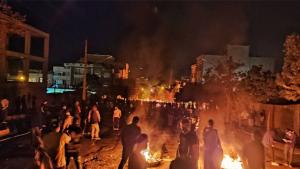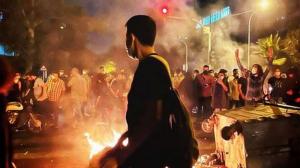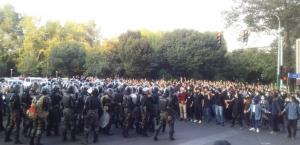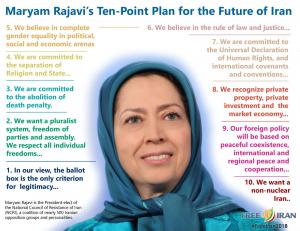Video: Iran uprising could lead directly to a new revolution and the ouster of the mullah’s dictatorship

Iran has now been undergoing a nationwide uprising for more than a month. The longevity, intensity, and scale of those protests have all seemingly come as a surprise to Western leaders, who have a long history of underestimating the Iranian people’s outrage.

“Resistance Units and the organized opposition are taking serious risks to play a vital role in organizing and sustaining these protests,” as they have done in the context of several other nationwide uprisings since the end of 2017 alone.
“it is time to recognize the right of the Iranian people to defend themselves and to overthrow this regime and to establish a free and democratic Iran.”
By: Alejo Vidal-Quadras
Iran has now been undergoing a nationwide uprising for more than a month. The longevity, intensity, and scale of those protests have all seemingly come as a surprise to Western leaders, who have a long and unfortunate history of underestimating the Iranian people’s outrage and the Iranian regime’s vulnerability.
Now there are more and more policymakers and analysts in Europe and the United States who are coming around to the realization that this uprising could lead directly to a new revolution and the ouster of the mullah’s dictatorship. But questions remain about whether the European Union or its member states will actually change their foreign policy to align with this newfound recognition of the potential for Iranians to chart a new future for themselves.
It bears mentioning that some Western policymakers already recognized that potential many years ago. And if you were to ask for reactions from among them, you would find very few expressions of surprise regarding the current trajectory of developments inside Iran. For instance, a politically diverse group of Members of the European Parliament, the Friends of a Free Iran, have long advocated for more assertive Western policies on the understanding that this would assist the Iranian people in achieving their long-frustrated goal of regime change.
Recently, FoFI issued a statement, signed by more than 170 European lawmakers, which states in no uncertain terms that “the prospect of change in Iran has never been this accessible,” and that “it is time to recognize the right of the Iranian people to defend themselves and to overthrow this regime and to establish a free and democratic Iran.”
That statement recognized that the current uprising has spread to 170 cities and 45 universities in all of Iran’s 31 provinces and that the movement is being led by women and the nation’s youth. The statement also noted that “Resistance Units and the organized opposition are taking serious risks to play a vital role in organizing and sustaining these protests,” as they have done in the context of several other nationwide uprisings since the end of 2017 alone.
In January 2018, amidst the first in the still-ongoing series of uprisings, none other than the regime’s Supreme Leader Ali Khamenei acknowledged the challenges that his own regime was facing from the organized opposition, namely the People’s Mojahedin Organization of Iran (PMOI/MEK). That longstanding pro-democracy group, he said, had “planned for months” to facilitate nationwide unrest and to popularize such provocative, anti-government slogans as “death to the dictator.”
Those same slogans are being repeated even now in the context of an uprising that began with expressions of popular outrage over the death of 22-year-old Mahsa Amini at the hands of Tehran’s “morality police.” The breadth and uniformity of this messaging are indicative of the public’s appetite for regime change, as well as the opposition’s role in making each new uprising contiguous with its predecessors.
This, too, is something that supporters of the MEK, both in the European Parliament and throughout the world, have long recognized while Western leaders have generally continued operating on the faulty assumption that there is no viable alternative to the mullahs’ regime. It is only natural that those leaders would hesitate to affirm the Iranian people’s right to self-determination if it was unclear to them what that self-determination would lead to, and whether it would be in line with the interests of Western nations. But groups like FoFI understand exactly what Iran’s next revolution will lead to. They have openly endorsed the Iranian resistance President-elect Maryam Rajavi’s 10-point plan for Iran’s future.
European Parliament, Friends of a Free Iran (FoFI), Meeting With Maryam Rajavi To Support Iran’s Nationwide Protests
Friends of a Free Iran (FoFI) at the European Parliament held a meeting on the eve of a vote on a resolution on Thursday in support of the Iranian people’s nationwide protests. Mrs. Maryam Rajavi, President-elect of the Iranian opposition coalition National Council of Resistance of Iran (NCRI), was invited to provide her knowledge about the latest developments related to the Iranian people’s uprising.
The Friends of Free Iran issued a press release regarding the meeting between Mrs. Rajavi and a group of MEPs. The full text of this press release is as follows:
Strasbourg, October 5, 2022 – On the eve of a vote on a resolution at the European Parliament in support of the Iranian people’s nationwide protests, at the invitation of the Friends of Free Iran, Mrs. Maryam Rajavi,
The President-elect of the National Council of Resistance of Iran (NCRI) explained the latest developments related to the Iranian people’s uprising to a group of members of the European Parliament.
Mrs. Rajavi said, “Today, Iran is on the brink of change, and women play a major role in the current uprising against this misogynist regime that denies women’s basic rights.”
“The true objective of the men and women in Iran is regime change and the establishment of a free and democratic republic, based on separation of religion and state,” she added.
Mrs. Rajavi said, “The people of Iran expect more than words of condemnation or sympathy from European countries. They expect practical steps, including, among others, the recognition of their right to defend themselves against the brutal attacks by the regime, and recognition of their right to resist and fight for their freedom.”
She also called on EU member states to shut down the regime’s embassies, recall their ambassadors from Iran, and subject any economic relation with the regime to the end of suppression and the release of all political prisoners.
In the meeting, Mr. Javier Zarzalejos, co-chair of the Friends of Free Iran intergroup, while appreciating Ms. Rajavi’s explanations, said that we in the European Parliament support your resistance, we are indebted to you for your long-term resilience against this regime. We are surprised by the courage of the Iranian people, especially women, during the demonstrations that are going on in Iran these days. Women’s protest is not only against the mandatory hijab, but goes back to the systematic and serious violations of their fundamental rights.
Mr. Milan Zver, the co-chair of Friends of Free Iran, said that we in the European Parliament are deeply grateful for your courage in opposing the religious dictatorship. Yesterday in the European Parliament, all speakers from left to right supported the resistance that is going on in Iran these days and this was a clear message to the Iranian regime.
Referring to the wave of protests of the Iranian people, Mr. Stanislav Polcak said we are shocked to hear the news of people being killed in the streets and we condemn this violence against the people. We have seen the strong desire of the Iranian people to destroy the regime, not only these days but for several decades. You deserve freedom.
Mr. Jan Zahradil said, I salute your patience and courage as you have been leading this resistance, which is the most organized resistance movement, for decades. The violence carried out by the regime these days was the last straw for those who still thought that it was possible to negotiate with this regime and that peaceful change was possible. Change is possible in Iran, there is only one precondition, and that is to stop concessions and negotiations with this regime and to stop appeasement. This policy has not worked, and it will not work.
Mr. José Manuel Fernandes stated that there is a consensus among all the democratic forces in the European Parliament that a ruthless dictatorial regime is in power in Iran, and I think that the European Parliament has a duty to the people of Iran. To support the Iranian resistance that defends democratic values.
Mr. Helmut Geuking said that the uprising in Iran, which is led by women, cannot stand idly by. We support you in the European Parliament, this regime does not represent the people of Iran.
That plan establishes key democratic principles such as secularism, gender equality, and equal protection under the law, and it sets the stage for the Iranian people to take part in their first truly free and fair elections. It describes a platform that has been tirelessly promoted by the MEK Resistance Units, especially in the wake of the January 2018 uprising. Between then and the outbreak of the current uprising last month, these activist collectives continually accelerated their activities while expanding their tactics to include the takeover of state media broadcasts, the destruction of pro-regime monuments, and so on.
The recent achievements of the Resistance Units and the MEK, in general, would have provided Western policymakers with ample reason to anticipate a broadly-supported, weeks-long uprising in the wake of Mahsa Amini’s killing, if not for the fact that so many of those policymakers have spent their entire careers marginalizing the Iranian Resistance and appeasing what they wrongly assumed was a politically stable Iranian regime. Now that collective surprise over the uprising is beginning to undermine that assumption, it is vital that the international community heed the advice given in the FoFI statement.
The statement offers five concrete recommendations for the EU, the United Nations, and their member states. First, it calls for the referral of human rights abuses to the UN Security Council and for other measures to halt the repression that has so far killed over 400 participants in the present uprising. Second, it recommends closing embassies and otherwise isolating the Iranian regime unless it definitively ends the crackdown. Third, it urges the international community to provide Iranians with reliable internet access in order to support their organizing efforts. Fourth, it recommends Magnitsky sanctions and other punitive measures for those responsible for the suppression of dissent and other malign activities.
Finally, the statement calls upon all democratic nations and their leaders to take the most basic step already taken by the likes of the Friends of a Free Iran, namely to “recognize the Iranian people’s democratic aspirations, their organized Resistance movement and right to establish a free, democratic and secular Iran.” To some, this might seem like a merely symbolic gesture, but with Iranians having undertaken several autonomous, anti-government uprisings over the past five years, it would be difficult to overstate the value of clear, unequivocal expressions of international support for the principles and leadership behind the movement for regime change.
Alejo Vidal-QuadrasAlejo Vidal-Quadras, a Spanish professor of atomic and nuclear physics, was vice president of the European Parliament from 1999 to 2014. He is currently president of the Brussels-based International Committee in Search of Justice (ISJ)
Shahin Gobadi
NCRI
+33661653231 ext.
email us here
The ten-point plan of Maryam Rajavi, President-elect of National Council of Resistance of Iran NCRI.
Legal Disclaimer:
EIN Presswire provides this news content "as is" without warranty of any kind. We do not accept any responsibility or liability for the accuracy, content, images, videos, licenses, completeness, legality, or reliability of the information contained in this article. If you have any complaints or copyright issues related to this article, kindly contact the author above.



